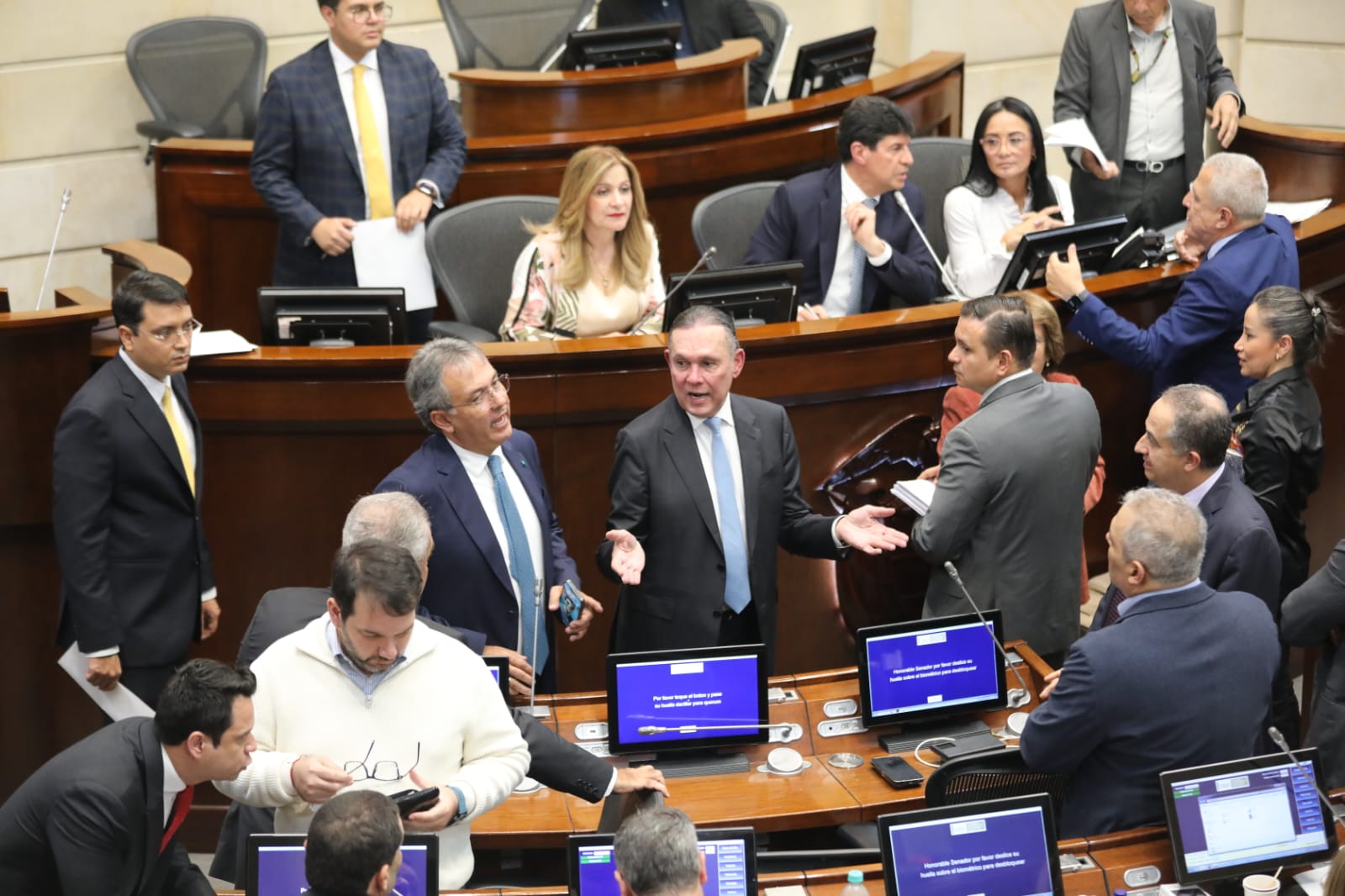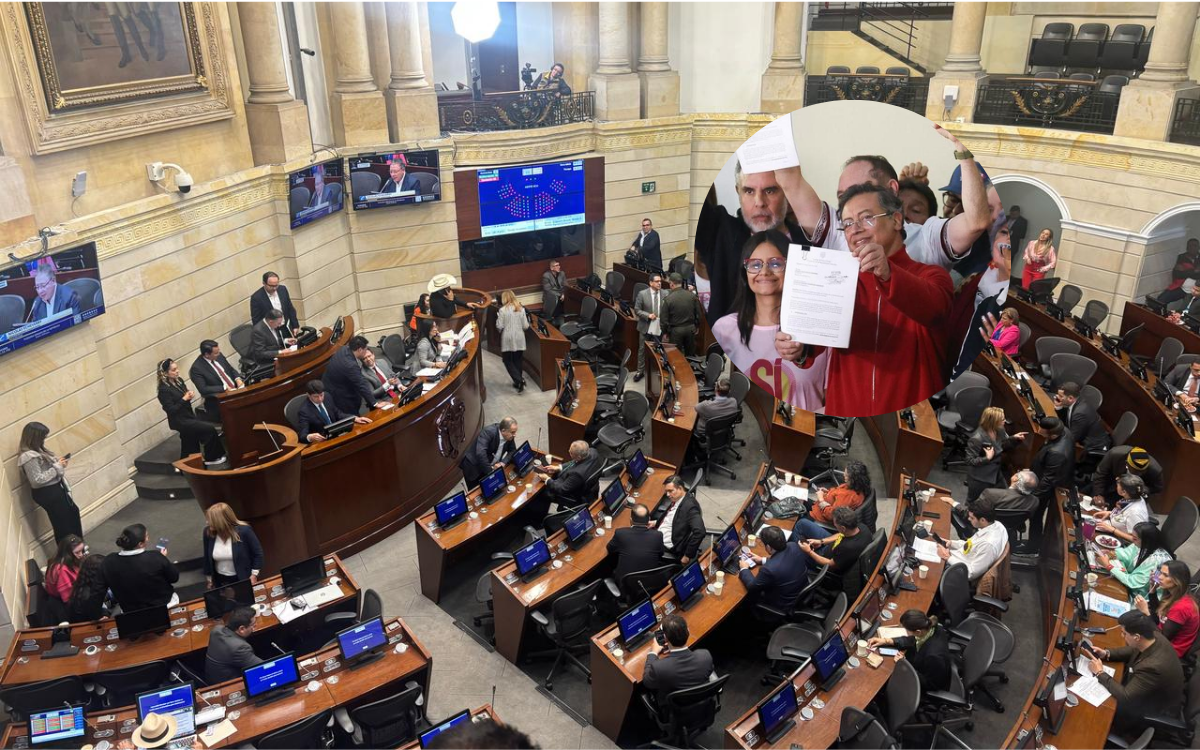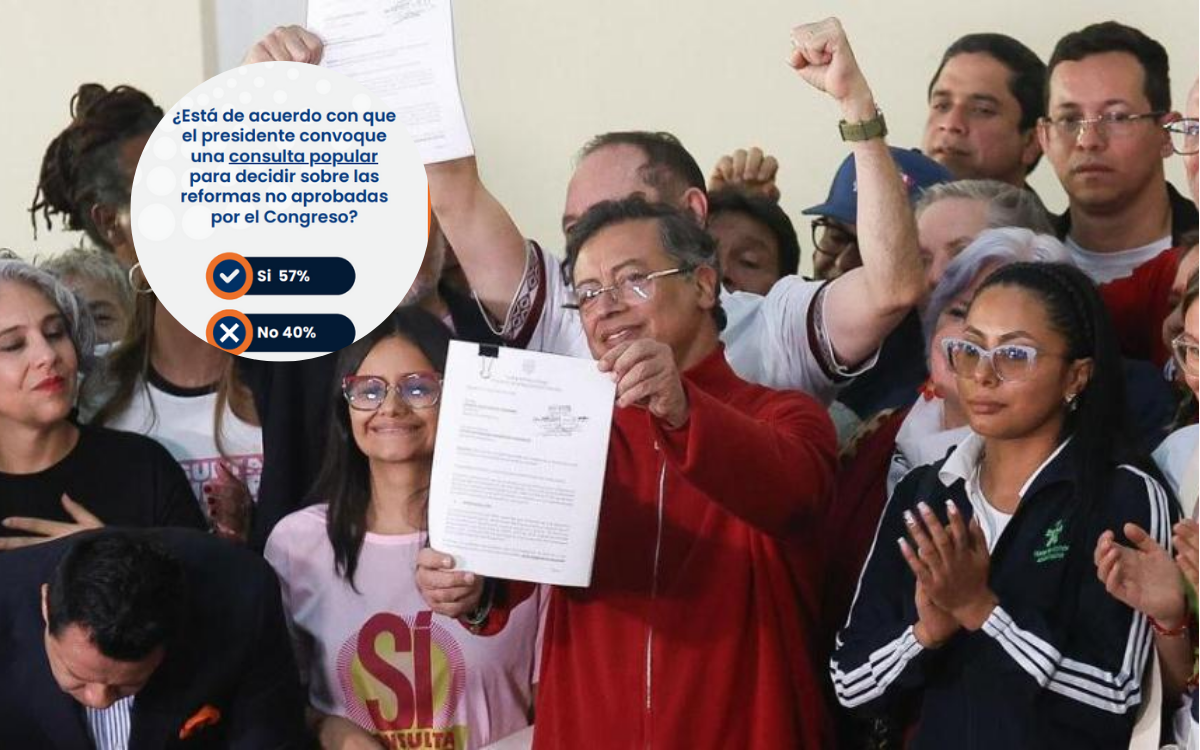'The fate of the consultation is not sealed': Efraín Cepeda

The President of Congress, Efraín Cepeda, asserts that, despite the limited time available to discuss and vote on the referendum in the Legislature, they are prepared, as the labor reform has already been discussed three times.
I was pleasantly surprised by the letter you sent to Congress, urging your colleagues to resist the threats and act with full awareness of their democratic duty, in the face of the avalanche of threats the President and the Administration have issued against Congress. It was a dignified statement very well underscored… Since my inaugural address as President of the Senate on July 20, I have expressed that I would defend the independence of the public powers, the separation of powers, the autonomy of each branch, and respect for them. Furthermore, I have been saying that the Legislative Branch cannot be an appendage to any other public branch. I believe the Executive Branch has made a mistake in trying to prescribe reforms that are not discussed, that are not agreed upon. And, in the midst of this, they have made absolutely free decisions in committees and plenary sessions, some in favor of the Government and others against it.

Efraín Cepeda, President of the Senate. Photo: Milton Díaz. EL TIEMPO
Let's remember that this episode of the labor reform vote dates back several weeks, when 200 people stormed the new Congress building where the Seventh Committee meets and intimidated those present. In the communication you refer to, I called attention to the President of the Republic's threats to recall Congress, which are nothing more than the threat of a coup d'état with threatening demonstrations and symbols of war like swords and flags that seek to undermine our will and intimidate parliamentarians. And of course, as president of this corporation, I cannot allow that. I also said that Congress has overcome other serious episodes in national life—the mafia, paramilitarism, and guerrillas—that have tried to subdue us. But Congress has always stood up.
You tell me that from day one you've fought for the independence of Congress. But you can't deny that many congressmen, as has always been the case, have also bowed to this government to receive what I call "puecos," which are positions and contracts. Even congressmen from your own party are not exempt. And now the category of bribery is added... What dignity? What independence of powers? Yes, that practice you mention should not be used to force congressmen to their knees and diminish their independence.
But shouldn't they lend themselves to it either? We have a commitment to history, to Colombians, to our families; and we should be able to look our children in the eye when we act independently. That's why I asked my colleagues not to give in to threats.
They've already reached the point where the death of a leader who was speaking through a megaphone, promoting the referendum, was blamed by the President himself on some named senators... It's absolutely unheard of. And as one of the senators said, because of this, "they hang a tombstone around your neck." I recently had to hold a meeting with the police forces to ask them for special protection for several senators, primarily for the members of the Seventh Committee who have actually been threatened; and I'm always included in those threats.
Do you recall a situation like this in your parliamentary career? Obviously, in the 20th century, Congress was shut down and even recalled. But personal threats? I've been sitting in the Senate for 33 years, and I've never seen a president of the Republic refer to it this way, not only to Congress, but also to the judiciary. He spends his time telling its members that they're censoring him, as well as the free press, which he attacks whenever he doesn't like its views. That's why I said that democracy is not negotiable.
He also said that "(...) our votes will be free, they will remain free, and they will be born of reflection, not coercion (...)". But I heard him say with surprise that tomorrow, Tuesday, the deliberations on the referendum questions will begin, and that they will begin voting on it starting Wednesday. So fast? And the reflection? Look, that was the reasoning that led the Senate to kill the issue of defection last week, a terrible sign for democracy, because it indicated that there could be changes of faction like changing sides. And with that reasoning, despite the fact that the National Government and the entire Historic Pact were in favor of supporting it, other parties took a very hard look and ended up killing the bill.

This Wednesday, the referendum vote will take place. Photo: Senate - Néstor Gómez. EL TIEMPO
This request was filed on May 1st. The Senate now has 20 days to approve it. There's also talk of up to 30 days, but an extension would have to be requested from the plenary session.
What if it is not accepted? It would be considered administrative silence, and they would adopt it by decree. So we really have until May 21st. I think what's needed now, and what I've asked for, is for the caucus meetings to take action to make decisions. That's why it's advisable to vote on May 14th, just one week before the deadline.
But the problem, Senator, is that the criticism of the articles has been far-reaching, coming from experts, unions, economists, merchants, and businesspeople. It has been pointed out that the questions are confusing and anti-technical, that they contain siren songs, and that the questionnaire is rigged to induce responses favorable to the government. But such a short timeframe will not allow for a thorough debate… If the questionnaire passes muster in Congress, the campaign would require an educational process for voters. But I believe the senators are sufficiently immersed in the debate that has been going on since the failed labor reform and, consequently, have had time to reflect. I agree that the questions are confusing, anti-technical, and lack fiscal backing. Furthermore, major think tanks have expressed that, like the previous reform, formal employment will be destroyed. There's talk of 450,000 jobs that would be destroyed and a consequent increase in informality. That's why I also asked why there's no mention of informality, which numbers 13 million or 14 million, and of the unemployed, which number around 3 million. For a Colombian who today might believe this benefits them, it could backfire, because they themselves could be the ones who lose their job or move from formality to informality, where they no longer have to request work permits, menstrual leave, sick leave, etc. And he'll have to see how he handles pension and health care contributions. Since this labor reform has already been discussed at length in the Senate, I think the criteria are set. What I ask again is a thoughtful vote. And that we not allow ourselves to be intimidated, because now I see fear and dread in some sectors of society due to the President's threats. No, democracy is much bigger than that.
Okay. But looking a little at the future, do you think this reflection, which you believe has already been addressed, is more in favor of approving the referendum questions or not? I have my opinion, of course. But when I speak in my communication about a free and thoughtful vote, it means that neither the Executive nor the Legislative branches can exert pressure or coerce the vote. Today, I wouldn't dare to give any figures. I see that opinions are divided, and a three-month referendum will further polarize our nation. That's worth almost a trillion pesos; meanwhile, what about subsidies for affordable housing, education, and healthcare? There's no money.

57% of respondents support President Petro's referendum . Photo: Néstor Gómez. EL TIEMPO - Polimétrico Survey
The Caribbean region, at least the departments of Atlántico, La Guajira, and Magdalena, are on the verge of a blackout because they don't have that trillion pesos. Energy subsidies for low-income families (strata 1, 2, and 3) aren't being distributed. We're not here to squander that trillion pesos...
So, let me put the question of futurology to you in a different way. There are two positions: those who support the referendum in every way, which is equally respectable, and those who definitively do not support it, because they have very serious flaws in many of them, if not all of them. Now, in this last group, there are two positions: those who say: "Well, it's better for Congress to approve that questionnaire and for us to defeat the President at the polls, preventing the threshold from being reached," and those who say: "No, that's a very risky proposition." What would be the best path? The best path is not to polarize the country, not to spend the trillion pesos, and instead to look at the reforms that are on the agenda. In fact, the Conservative Party presented a labor reform bill that more or less included these elements, but the Seventh Committee of the House of Representatives dismissed it and didn't analyze it. The Conservative Party believes in the need for labor reform, but one that must be agreed upon, not imposed. That's why I insist that Congress cannot be an appendage of the Executive Branch, because we'll destroy democracy and the balance of power. In my letter, I also call for restraint. I believe we can debate ideas without aggression, something I've rarely seen in my 33 years of parliamentary life.
I've never seen a president of Congress called a "scumbag" by the president of the Republic. I've never seen those who don't support a government reform bill called "scumbag slavers." That language is untenable. For one thing, does the referendum questionnaire have to be all or nothing? Congress can partially approve it, cross out some questions and leave out others, but that won't save us a single peso of the trillion dollars it's going to spend. We'd better go to the Seventh Committee.
Finally, Senator Cepeda, what do you think of the letters written by your fellow party member, former Foreign Minister Álvaro Leyva, regarding President Petro's behavior? In addition to these accusations, he mentions and supports several of the senators: Nadia Blel, Senator Pinto, and me. Of course, we appreciate that support, because sometimes we feel alone in this battle and in this struggle to defend democracy. Ultimately, we are defending the interests of the people, of the 450,000 jobs that will be lost, of the additional 12 percent of Colombians who would be forced into the informal sector, of the microenterprises that would go bankrupt and exit the market...
I got off topic from my last question. Dr. Leyva concludes, based on the examples he mentions of President Petro's erratic behavior, which he witnessed, that the Colombian president should resign because he is incapable of managing the country. Do you think that's a solution? I must say two things here. First, the mental health of the leaders is essential. And second, I would look at the evidence and legal proceedings. I am a democrat, and I think not only about the balance of power, but also about the completion of mandates. We will have to delve into these statements by former Minister Leyva. This is the second time he's made them, and I see that a US congressman has also been making this point, which at least requires a serious statement from the President of the Republic.
Well, Senator, much success in your own conclave. There remains the concern, however, of the limited time available for reflection and for a vote that will be almost lightning fast... I believe, as I told you, that the criteria have already been formed and that we are ready for the vote. I haven't heard from any senator that they need more time to study the substantive questions. That has already been done. This is the third time that the Congress of the Republic, I reiterate, has studied a labor reform in depth.
Speaking of this futurology, it seems that the forces are leaning toward a "yes" vote, because there are parties like the "Mona" of the "U" party, part of the Liberal and Conservative parties, not to mention the governing parties, who are inclined to support the referendum. Do you think the die is cast? We'll see what happens with the caucus meetings, as those decisions are mandatory. The Conservative Party will make them, and I hope the others will too. But I don't think the die is cast. I think this past weekend, with Mother's Day on the horizon, was a time for reflection, looking mothers, wives, and children in the eye.
eltiempo





